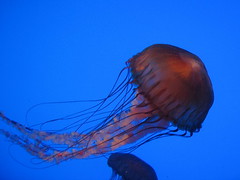Articles by Andrew Sharpless
Andrew Sharpless is the CEO of Oceana, the world's largest international nonprofit dedicated to ocean conservation. Visit www.oceana.org.
All Articles
-
An influx of jellies in strange places is not so hard to explain
 Over Thanksgiving, I came across a news story that may represent the perfect storm of issues plaguing the oceans. A salmon farm in Northern Ireland was wiped out by a huge swarm of mauve stingers (Pelagia noctiluca), a jelly usually found in the warm Mediterranean sea.
Over Thanksgiving, I came across a news story that may represent the perfect storm of issues plaguing the oceans. A salmon farm in Northern Ireland was wiped out by a huge swarm of mauve stingers (Pelagia noctiluca), a jelly usually found in the warm Mediterranean sea.In a 35-foot-deep, 10-square-mile swath, the jellies stung and killed 100,000 salmon before workers could reach the pens. It must have been quite a sight. The jelly's scientific name means "light of the sea," and the creatures give off an eerie, purple-red glow. I can only imagine that, at that scale, the sea looked possessed.
The incident may seem strange and isolated, but it touches on three major issues facing the oceans.
-
A bottom trawler scores underwater pot, and it’s open season for Japanese whalers
... a study found that just 79 percent of known fish species has been formally described, and that the largest gaps in knowledge centered on the oceans' most diverse habitats ...
... California governor Arnold Schwarzenegger suspended all fishing in the San Francisco Bay after the area's worst oil spill in two decades. The governor called the 58,000 gallon spill, which occured after a cargo ship collided with the San Francisco-Oakland Bay Bridge, an "unbelievable human failure" ...
... German scientists developed LOKI, a device that can recognize and count organisms as small as 0.2 millimeters across. It will be used to study zooplankton, a critical food source for juvenile fish ...
-
Six tons of fish soup in Russia, 500 tons of pee in the Pacific
Investigators found that fisherman caught twice their legal quota of bluefin tuna in European waters this year, despite an early closure to the season due to the stocks' precipitous decline ...
... a trout farm in Nova Scotia was torn apart by Tropical Storm Noel, freeing an estimated 500,000 fish and causing $1 million in damages ...
... endangered humpback and fin whales swam hundreds of miles north of their usual habitats in search of colder waters. "All signs point to global warming," said an advocate ...
... Korean scientists successfully transported a live flatfish out of water for a 20-hour transatlantic flight to Los Angeles. The fish went into an induced hibernation inside a plastic bag ...
... an Australian company was planning to use 500 tons of industrial urea in a bid to promote plankton growth in the Pacific. The company preferred the term "nutrient injection" to "dumping" ...
-
Iraqi catches shark, blames America
... in Iraq, a shark was found 160 miles from the sea in an irrigation canal that joins the Euphrates River. "I believe America is behind this matter," said the Iraqi who netted it ...
... the seasonal growth of water hyacinth disrupted local fishing activities along the coast of Lagos in Nigeria. The plant can grow rapidly enough to choke waterways overnight ...
... Turkish academics decided to establish the country's first rehabilitation center for sea turtles ...
... salmon fishing on Oregon's Rogue River was poor this season ...
... the New England Fishery Management Council decided not to end its scallop season on Nov. 1, a move usually made to protect sea turtles off the eastern U.S. coast ...
... an ocean quahog clam dredged up off the coast of Iceland was thought to be the oldest living creature ever discovered. The clam was nicknamed Ming in reference to the Chinese dynasty that was in power at the time of its birth 405 to 410 years ago. The clam died when the researchers counted its rings ...